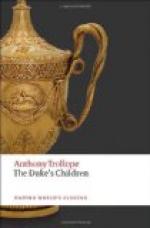‘Isn’t it a great grind, sir?’ asked Silverbridge.
’A very great grind, as you call it. And there may be the grind and not the success. But—’ He had now got up from his seat at the table and was standing with his back against the chimney-piece, and as he went on with his lecture,—as the word ‘But’ came from his lips—he struck the fingers of one hand lightly on the palm of the other as he had been known to do at some happy flight of oratory in the House of Commons. ’But it is the grind that makes the happiness. To feel that your hours are filled to overflowing, that you can hardly barely steal minutes enough for sleep, that the welfare of many is entrusted to you, that the world looks on and approves, that some good is always being done to others,—above all things some good to your country;—that is happiness. For myself I can conceive none other.’
‘Books,’ suggested Gerald, as he put the last morsel of the last kidney into his mouth.
’Yes, books! Cicero and Ovid have told us that to literature only could they look for consolation in their banishment. But then they speak of a remedy for sorrow, not of a source for joy. No young man should dare to neglect literature. At some period of his life he will surely need consolation. And he may be certain that should he live to be an old man, there will be none other,—except religion. But for that feeling of self-contentment, which creates happiness—hard work, and hard work alone, can give it to you.’
‘Books are hard work themselves sometimes,’ said Gerald.
‘As for money,’ continued the father, not caring to note this interruption, ’if it be regarded in any other light than an as a shield against want, as a rampart under the protection of which you may carry on your battle, it will fail you. I was born a rich man.’
‘Few people have cared so little about it as you,’ said the elder son.
‘And you, both of you, have been born to be rich.’ This assertion did not take the elder son by surprise. It was a matter of course. But Lord Gerald, who had never as yet heard anything as to his future destiny from his father, was interested by the statement. ’When I think of all this,—of what constitutes happiness,—I am almost tempted to grieve that it should be so.’
‘If a large fortune were really a bad thing,’ said Gerald, ’a man could I suppose get rid of it.’
’No;—it is a thing of which a man cannot get rid,—unless by shameful means. It is a burden which he must carry to the end.’
’Does anybody wish to get rid of it, as Sinbad did of the Old Man?’ asked Gerald pertinaciously. ’At any rate I have enjoyed the kidneys.’
’You assured us just now that the bread and cheese at Ely were just as good.’ The Duke as he said this looked as though he knew that he had taken all the wind out of his adversary’s sails. ’Though you add carriage to carriage, you will not be carried more comfortably.’




